Mosa Maastricht large transferware Delft style porcelain garniture set with castle decor
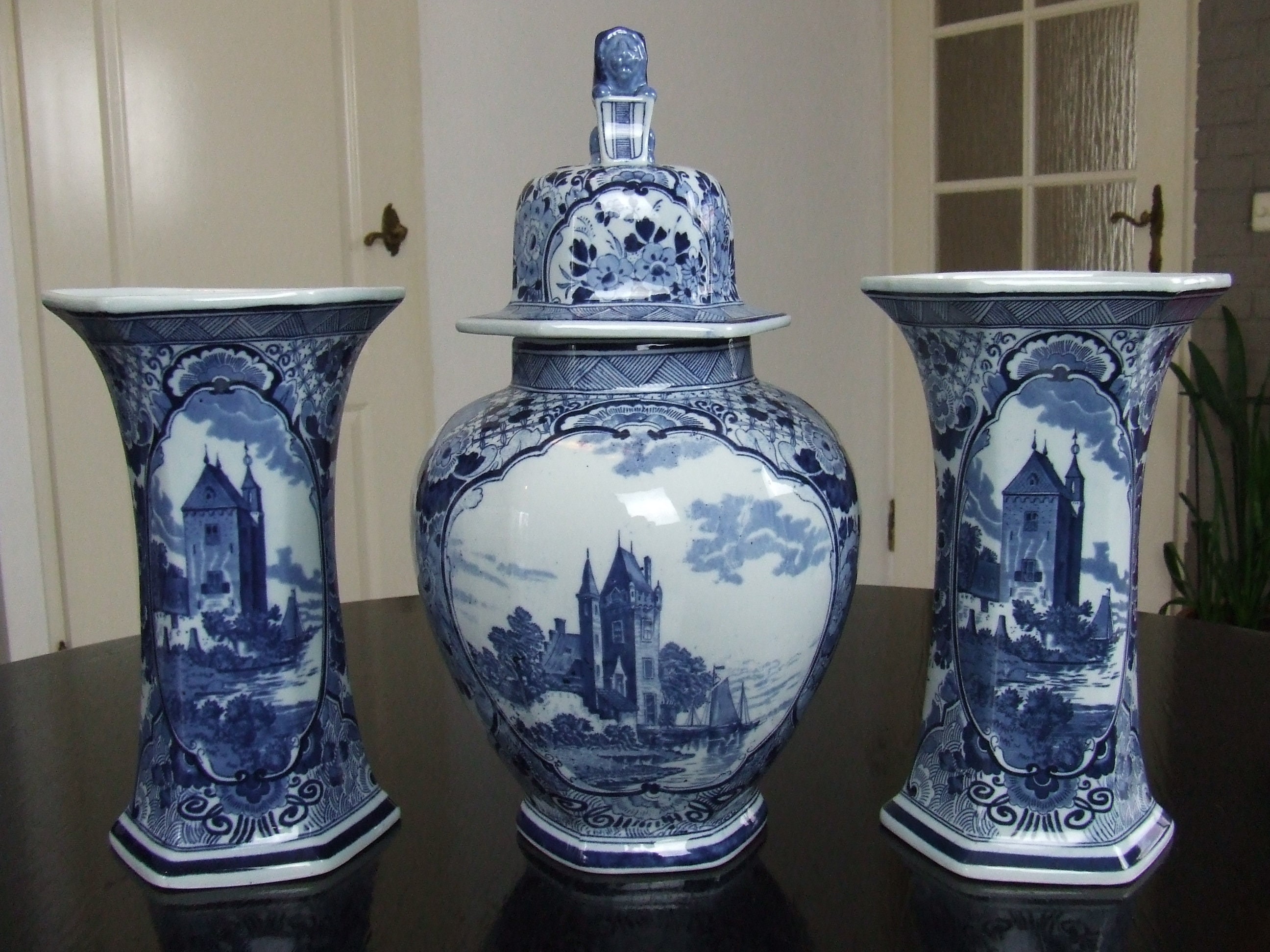
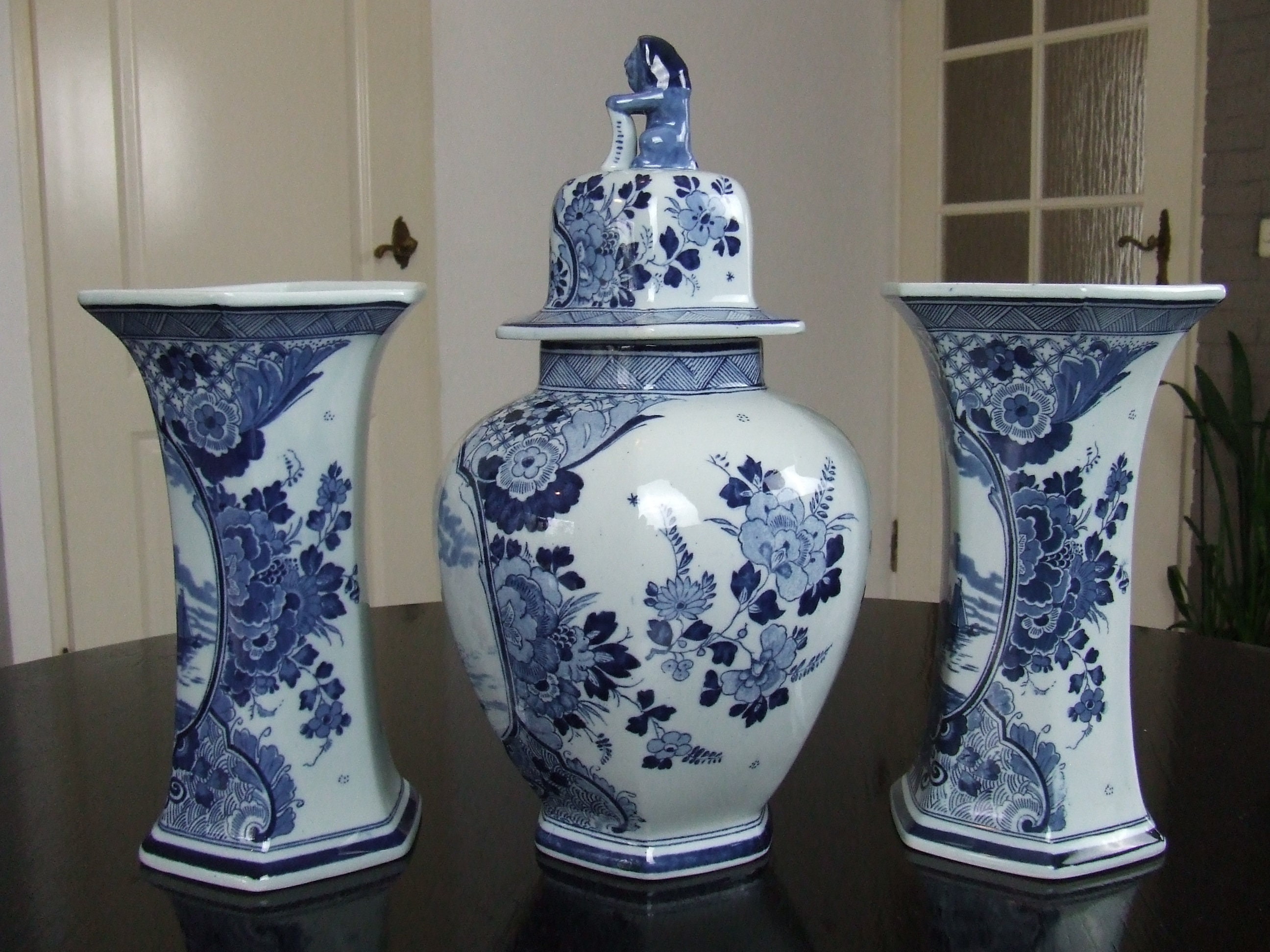
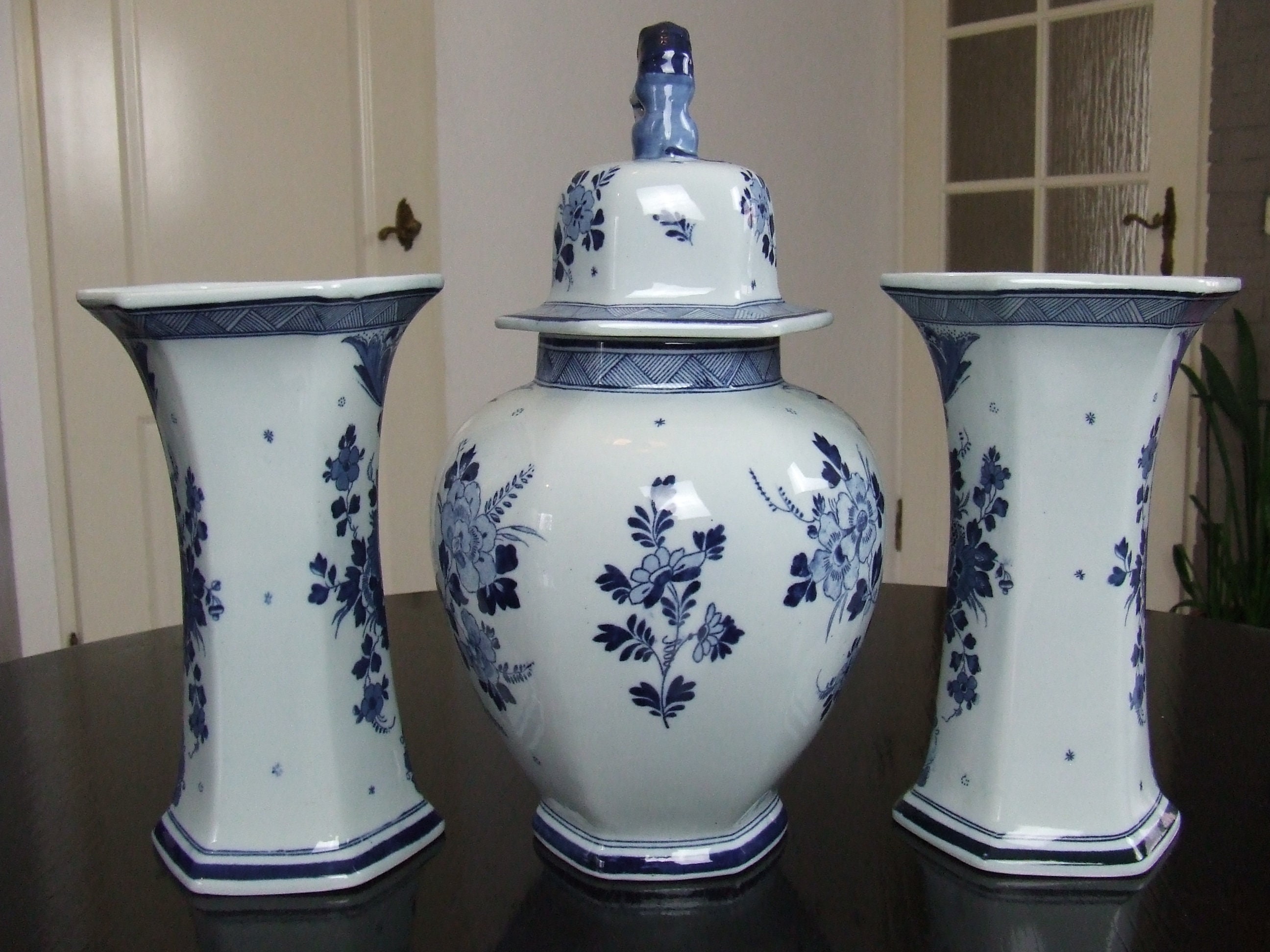
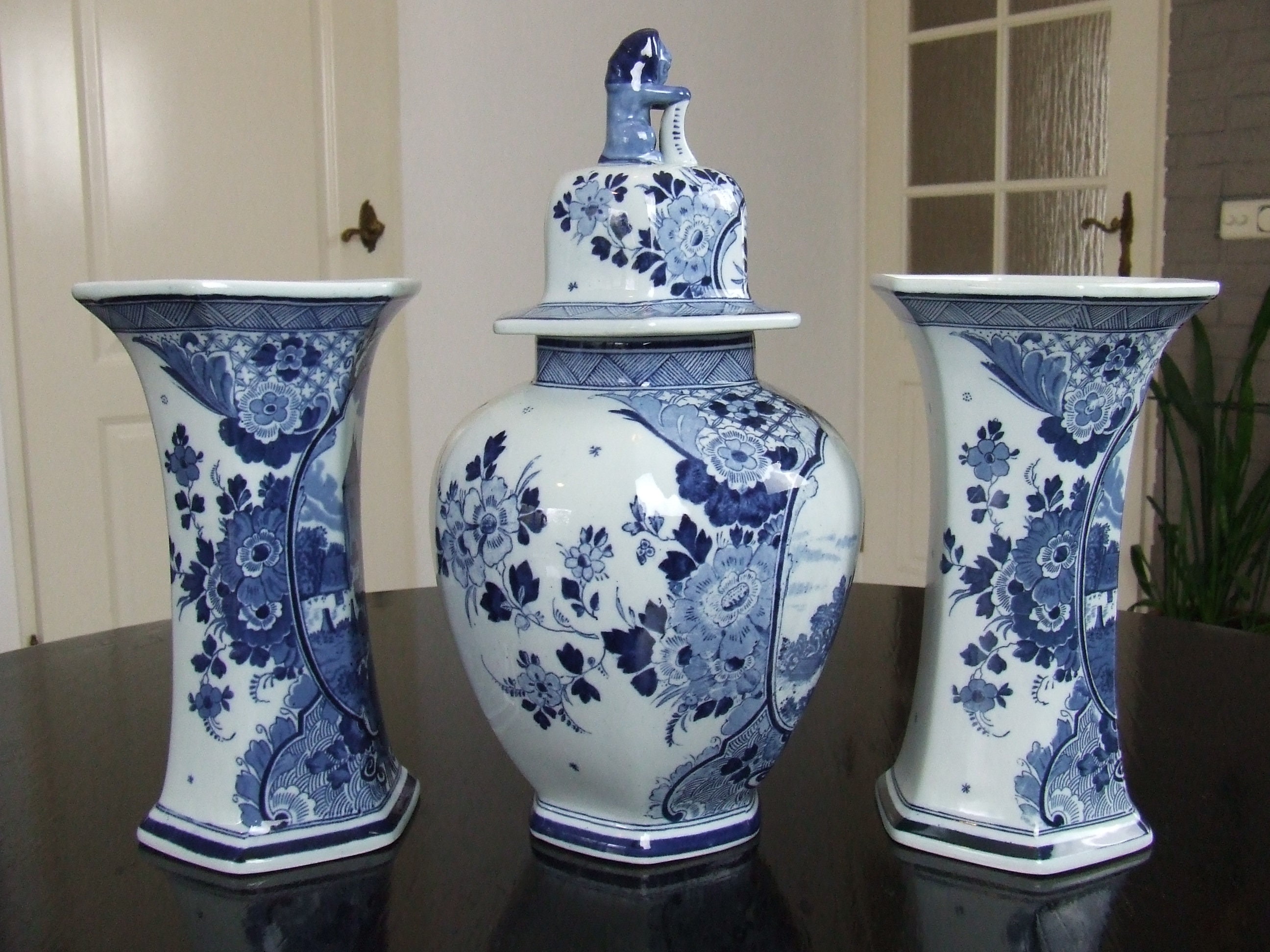
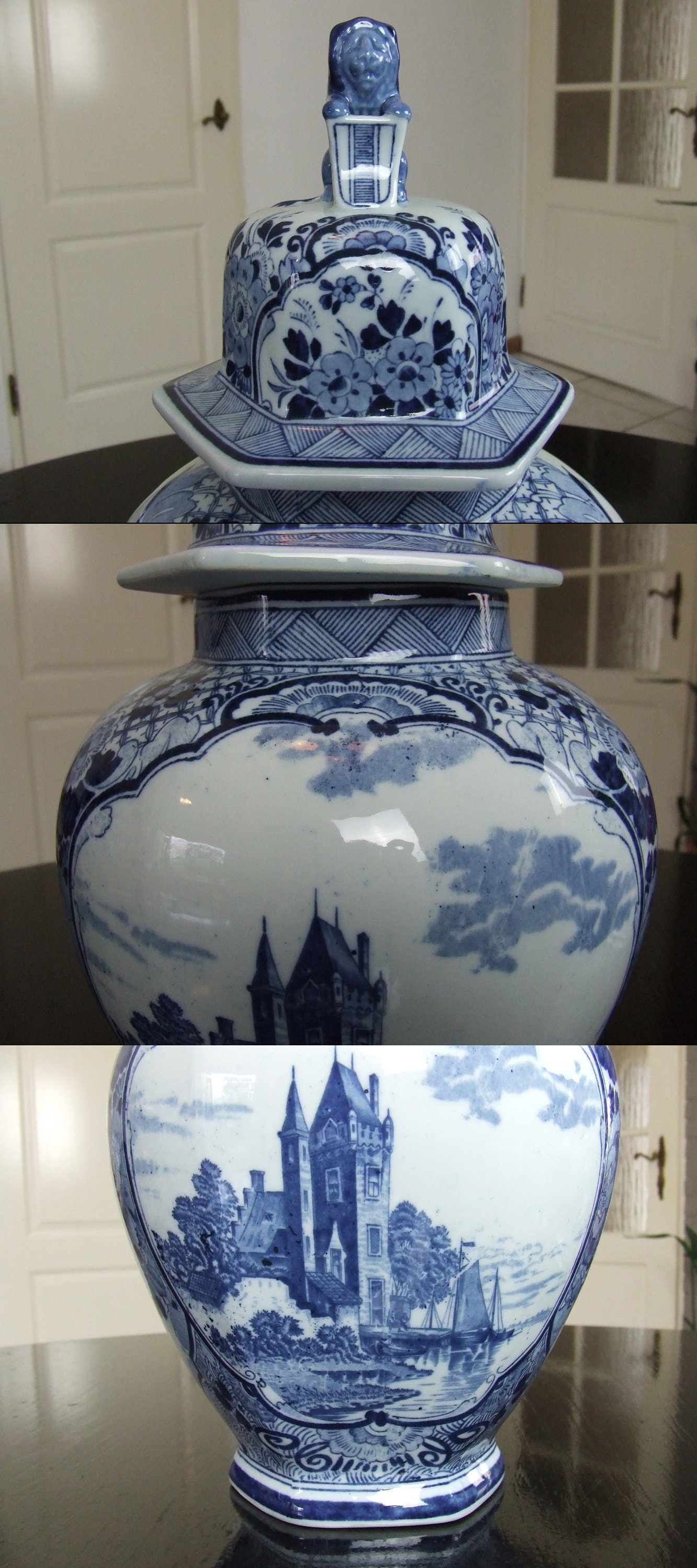
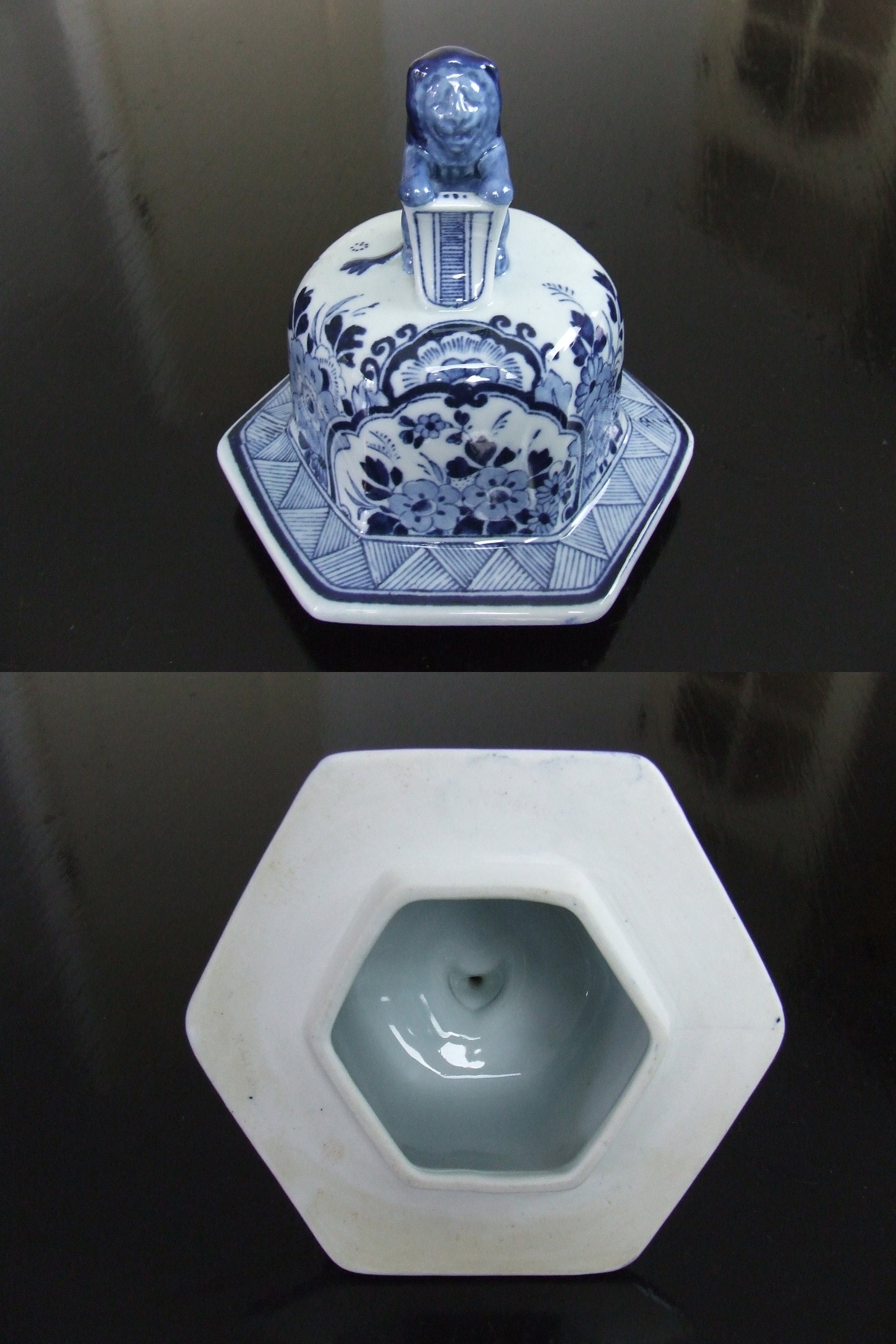
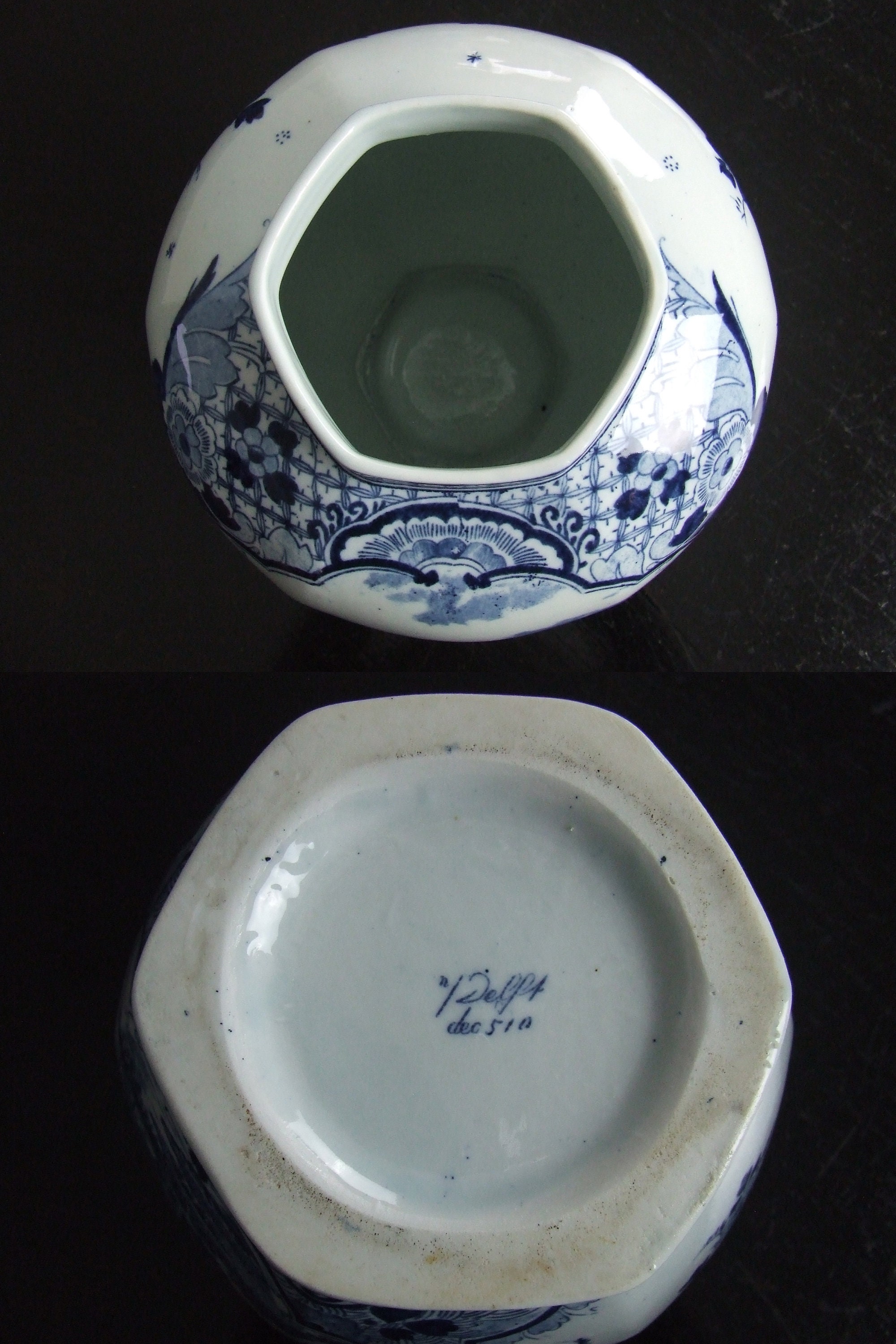
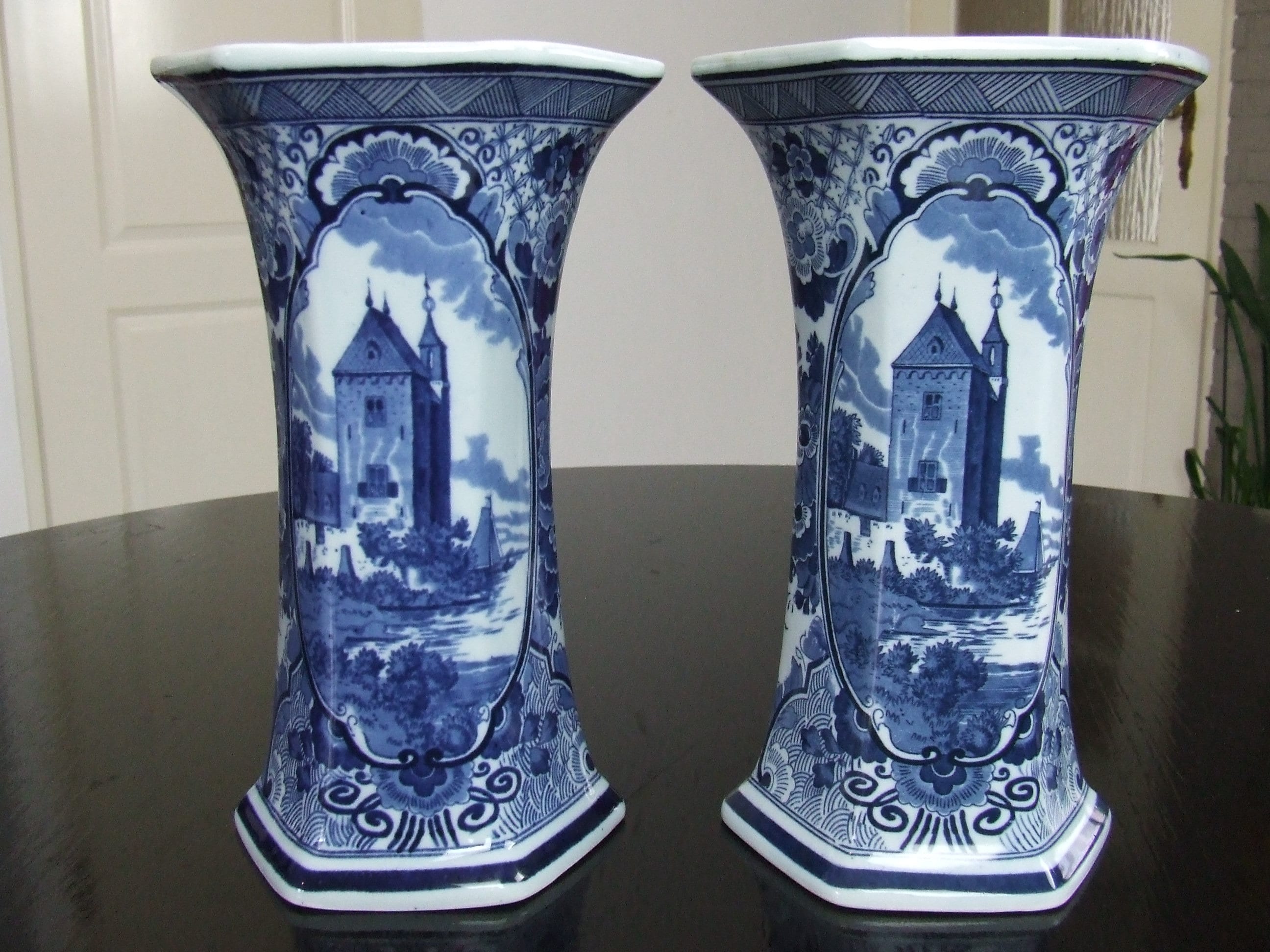
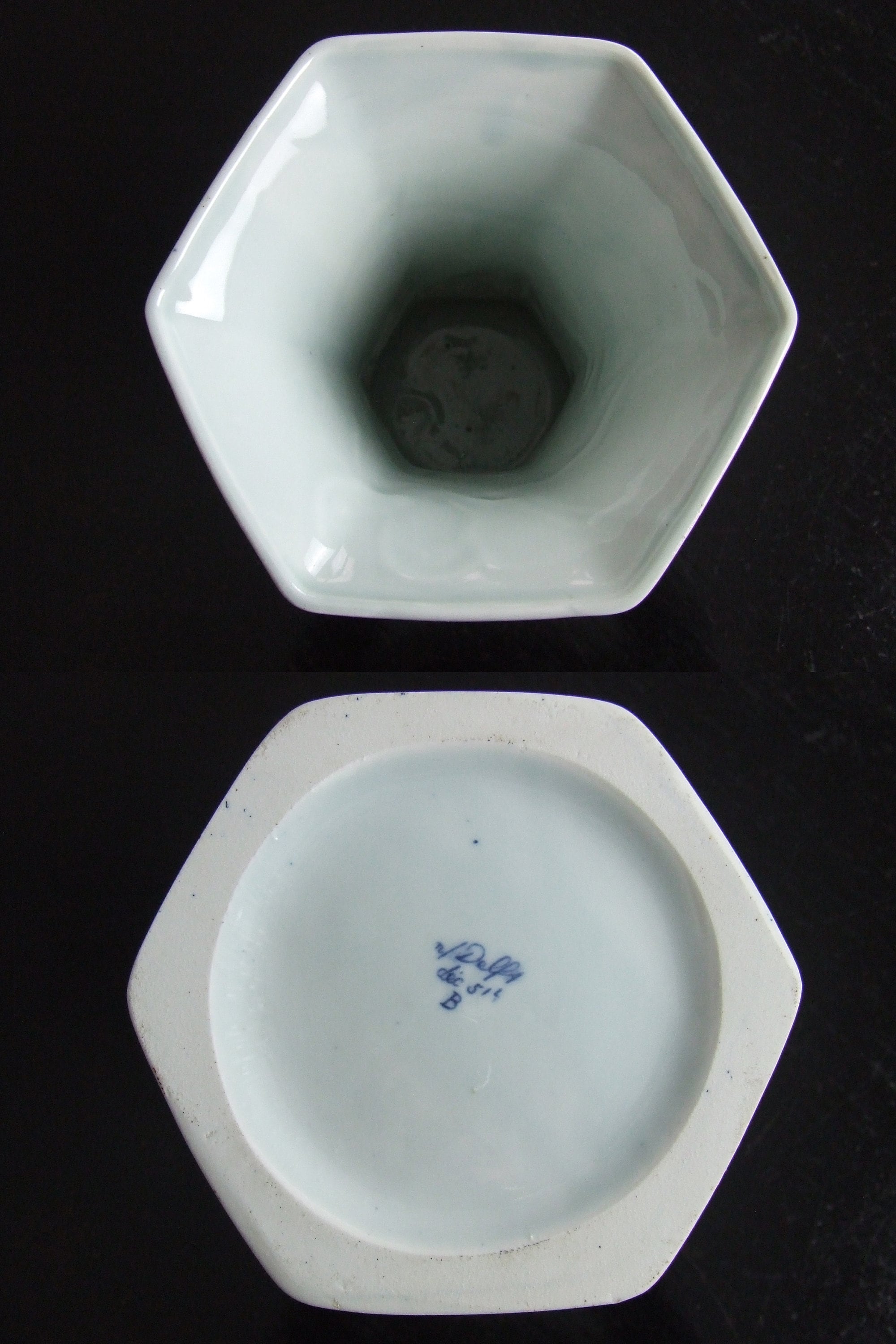
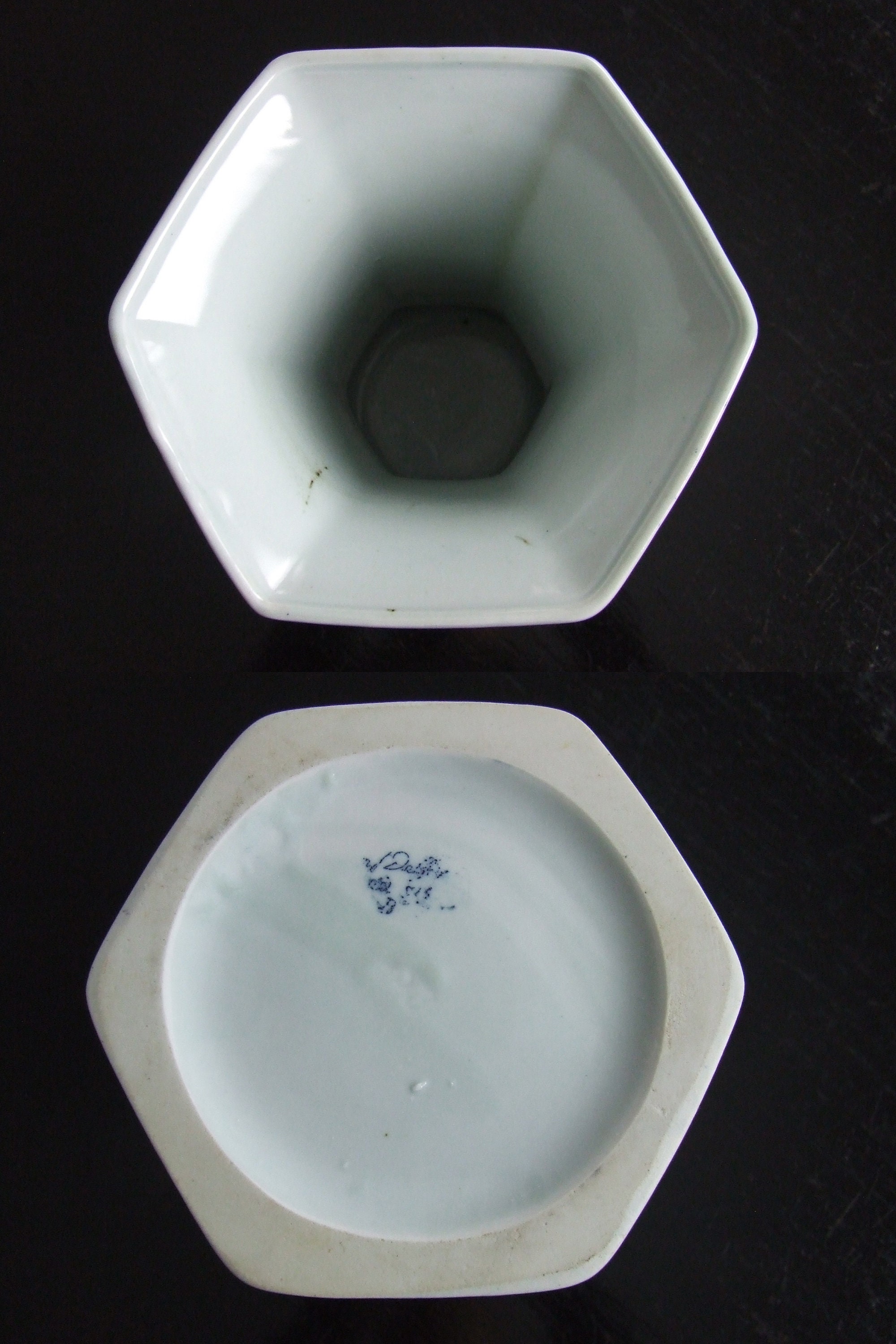
$221.72
Large 3-piece Delft style transferware garniture set made between 1900 and 1930 by Mosa in Maastricht, the Netherlands.
The set features a large (40 x 22,5 cm) covered vase with two matching beaker vases (28 x 18 cm). The hexagonal (six-sided) white porcelain vases are decorated underglaze with blue transfer prints applied by hand. The vases feature on the front side a large cartouche with a castle or wall tower near a lake with boats. The cartouches are surrounded by Delft style leaf and flower ornaments which continue from the front side to the back. The lid of the centre vase is decorated in a similar way, with a floral cartouche on the front surrounded by Delft style ornaments which continue to the back. The lid is crowned with a finial in the shape of a lion holding a heraldic shield. Both beaker vases have an identical decoration, with the print on one vase being slightly more blurry than on the other. The vases are very robust, with thick walls made to last a lifetime or longer.
The bottom of the vases are marked with a "n/Delft" (which is short for "naar Delft", meaning "after Delft" or "Delft style") mark which was used by Mosa between 1900 and 1930. It includes the decor number, which is 514 B for both beaker vases and 510 for the lidded vase.
Condition: the vases are in a very good condition, without any hairlines, cracks, damages or restorations. There is very little wear to the glaze of the vases, which has a beautiful rich gloss. One of the beaker vases has a few dark spots on the inside of the vase (see detail pictures), which is not very noticeable but should be mentioned. The insides of the vases are fully glazed and very clean.
An impressive and very sturdy antique (or nearly antique) Delft style garniture set in very good condition. This set will look great in a variety of interiors, from classic to modern.
Made by: Mosa
Place of manufacture: Maastricht, the Netherlands
Year of manufacture: between 1900 - 1930
Method of decoration: underglaze transfer print with some additional handpainting on the finial
Size: covered vase: height 40,0 cm, diameter 22,5 cm (capacity 5,3 litres); beaker vases: height 28 cm, width 18 cm (point to point), depth 16 cm (flat side to flat side) (capacity each 1,8 litres)
Weight: covered vase: 2,8 kg, each beaker vase: 1,33 kg (total weight of the set: 5,46 kg)
Additional pictures can be provided if required.
----------------------------------------------------------------------
About Mosa:
Royal Mosa is a ceramic factory based in Maastricht, in the southernmost point of the Netherlands. Mosa was founded in 1883 by Hubert Gérard Louis (Louis I) Regout, who was one of the sons of Petrus Regout who in 1836 had founded the ceramic factory P. Regout in Maastricht. In its first few years the new factory was known as Louis Regout. After a few years the factory adopted the name Mosa, which is the Latin name for the river Maas (Meuse), on which banks Maastricht is located. To avoid competition with the P. Regout factory, Mosa specialised in high quality porcelain wares instead of the earthenware (stoneware) produced by the older factory.
At Mosa the decoration was most often applied by transfer print: a method whereby a monochrome print on paper (from an engraved copper or steel plate) is transferred by pressing it onto the ceramic piece. This transfer process was done by hand. Although transfer printed items lack the vibrancy of handpainted items, the process does allow for the production of beautiful, detailed and decorative items, which would be very expensive or impossible to produce by hand painting.
The transfer printed items of Mosa are often of a high quality, because they used detailed transfers on a bright white porcelain background. Until 1935 much of the items were blue and white Delft or Chinoiserie style items, sometimes a mixture of both. Chinoiserie style items were sometimes marked with pseudo-Chinese marks, while Delft style items were marked with "n/Delft", which is short for "naar Delft", meaning "after Delft" (Delft style). A range of tableware with a chinoiserie decor called "Lange Lijs" ("Long Eliza" in English) became especially popular and is still collected by many in the Netherlands (see https://nl.wikipedia.org/wiki/Lange_Lijs).
From 1932 Mosa also started to produce earthenware (stoneware) items, as demand for expensive porcelain was decreasing. Also the production of wall tiles became important for the factory. More contemporary designs were adopted for the decorative items and tableware, especially after the second world war. During the 1970s the focus shifted towards porcelain tableware for restaurants, hotels etc. In 1996 the activities were separated into a branch that specialised in producing floor and wall tiles (Royal Mosa, see www.mosa.com/en-us) and a branch that continued to produce professional porcelain tableware (first called "Mosa Porselein", later "Maastricht Porselein", see www.wegter.nl/en_US/page/571/eigen-merk-maastricht-porselein/). Both branches still continue to produce successfully today.
----------------------------------------------------------------------
This beautiful set will be very carefully packed and send by tracked and insured mail.
If you are not satisfied with your purchase, you may contact us within 14 days from the delivery date to return the item. If the item is returned in its original condition, we will issue a refund for the total purchase price of the item (return shipping costs are however not covered).
Buyers are responsible for any tariffs, duties and fees that may apply. Decorative ceramics imported to the USA from the Netherlands (European Union) are subject to an import duty of 15% of the item value.
Shipping from The Netherlands
Processing time
1-2 business days
Customs and import taxes
Buyers are responsible for any customs and import taxes that may apply. I'm not responsible for delays due to customs.
Payment Options
Returns & Exchanges
I gladly accept returns
Just contact me within: 14 days of delivery
Ship items back to me within: 30 days of delivery
I don't accept exchanges or cancellations
But please contact me if you have any problems with your order.
Conditions of return
Buyers are responsible for return shipping costs. If the item is not returned in its original condition, the buyer is responsible for any loss in value.
Frequently Asked Questions
What are your shipping times?
We will send off your order within one or two working days. We use the standard parcel service of PostNL to ship our parcels. You can find their estimated delivery times per country here (shortened link to pdf download of PostNL): https://bit.ly/3ZHTMJ9. In the fourth column (parcels) you can find the delivery times of the standard service (in estimated business / working days). Please keep in mind that customs / import procedures in non-EU countries can sometimes add an extra week (or even two weeks) to the delivery times.
For shipments to the USA we use FedEx Economy delivery, as PostNL temporarily does not deliver to the USA due to changes in import duties. Estimated delivery time is four days after shipping, if all goes well at customs.
How do you pack your items, will my item arrive safely?
Broken ceramics is a thing we do not like! Not only is it a waste of time and money, but it also (often) means the end for a rare and unique item, which was treasured and cared for by their previous owners. So we really want to avoid any damages during shipping!
We have lots of experience of shipping ceramics, and we have seen what works and what does not work to protect ceramics during transit. If we ship multiple items in one package, each item is carefully wrapped and kept well seperated from the other items. We use large boxes, with plenty of buffer all around the items, so the packages can withstand a lot of abuse. All our packages should be able to cope with a 1,5 m drop without the items getting damaged.
Do you take care of the environment?
Yes we do. We re-use packaging materials as much as possible, which means we rarely need to buy new materials for our packaging. Only foam peanuts are sometimes bought by us, in which case we prefer to use green starch based peanuts which are fully biodegradable, non-toxic and water-soluble.
Each year, we calculate the greenhouse gas emissions in CO2-equivalents caused by our shipping. We multiply that amount by 200% and then offset it in certified CO2 compensation projects based on tree planting / reforestation in various parts of the world. So far, we have offset 35,5 tonnes of CO2 emissions in projects in Bolivia and Borneo (Indonesia). See https://treesforall.nl/en/projects/ for more information on the projects.
How should I take care of my Dutch ceramics?
First of all, don't let them fall! Always handle them in a mindful way and put them in spots where they cannot be accidentally bumped over when cleaning or vacuuming. Some people put some (clean) sand in vases to make them more stable.
Second, don't clean them too often! Underglaze painted Gouda and Delftware can be perfectly cleaned with water if necessary, but often just dusting them off or polishing them up a bit with a soft dry cloth is enough. Overglaze painted items should not be cleaned too often.
The colours of ceramics do not fade in sunlight, so you can put them in bright spots where they look good. But do avoid large temperature differences, which will cause increased crazing in many Delftware and also Gouda type pieces.